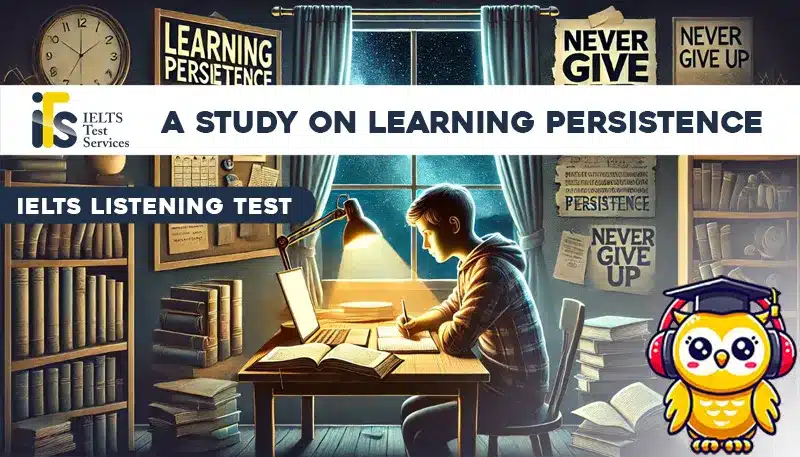A Study on Learning Persistence
Choose the correct letter, A, B, or C
1. Participants in the learner persistence study were all drawn from the same:
2. The study showed that when starting their course, older students were worried about:
Complete the notes below
Write ONE WORD ONLY for each answer.
| Social and Environmental Factors | Other Factors | Personal Characteristics | |
| First level of importance | Effective support | Perceived success in study | Enjoyment of a |
| Second level of importance | Positive experience at | Good | Many in daily life |
| Third level of importance | Good interaction with the | No family problems | Capacity for multitasking |
Complete the notes below
Write ONE WORD ONLY for each answer.
8. Ask new students to complete questionnaires to gauge their level of
9. Train the selected students to act as
10. Outside office hours, offer help
Questions Attempted
Test Results
| Question | Your Answer | Correct Answer | Result |
|---|
We’re Calculating Your Result
Solved Answers & Explanation
IELTS Listening Transcript Answer Analyzer
Question 1: Answer is B
Relevant Line: “For social and environmental factors, a significant number of students said it was crucial to have effective support, whether from their tutors or friends.”
Question 2: Answer is A
Relevant Line: “Many respondents regarded the life they enjoyed at school as an important social factor because it gave them good experiences.”
Question 3: Answer is challenge
Relevant Line: “Regarding personal characteristics, a sizable percentage of participants said they like to take up a challenge.”
Question 4: Answer is school
Relevant Line: “Many respondents regarded the life they enjoyed at school as an important social factor because it gave them good experiences.”
Question 5: Answer is health
Relevant Line: “In the second column, other factors, a lot of people said that the most significant thing was decent health.”
Question 6: Answer is interests
Relevant Line: “They should have a range of interests in their everyday lives because this could broaden their minds.”
Question 7: Answer is tutors
Relevant Line: “Under social factors, several respondents said that they had been keeping close to their tutors in their three-year university studies.”
Question 8: Answer is maturity
Relevant Line: “We should distribute questionnaires to the freshmen to make clear of their maturity when they begin the course.”
Question 9: Answer is advisors
Relevant Line: “We should find ways to offer training sessions to the students who are selected to encourage them to play the role of advisors.”
Question 10: Answer is online
Relevant Line: “Researchers have pointed out that this online service is actually more accessible than traditional services.”

